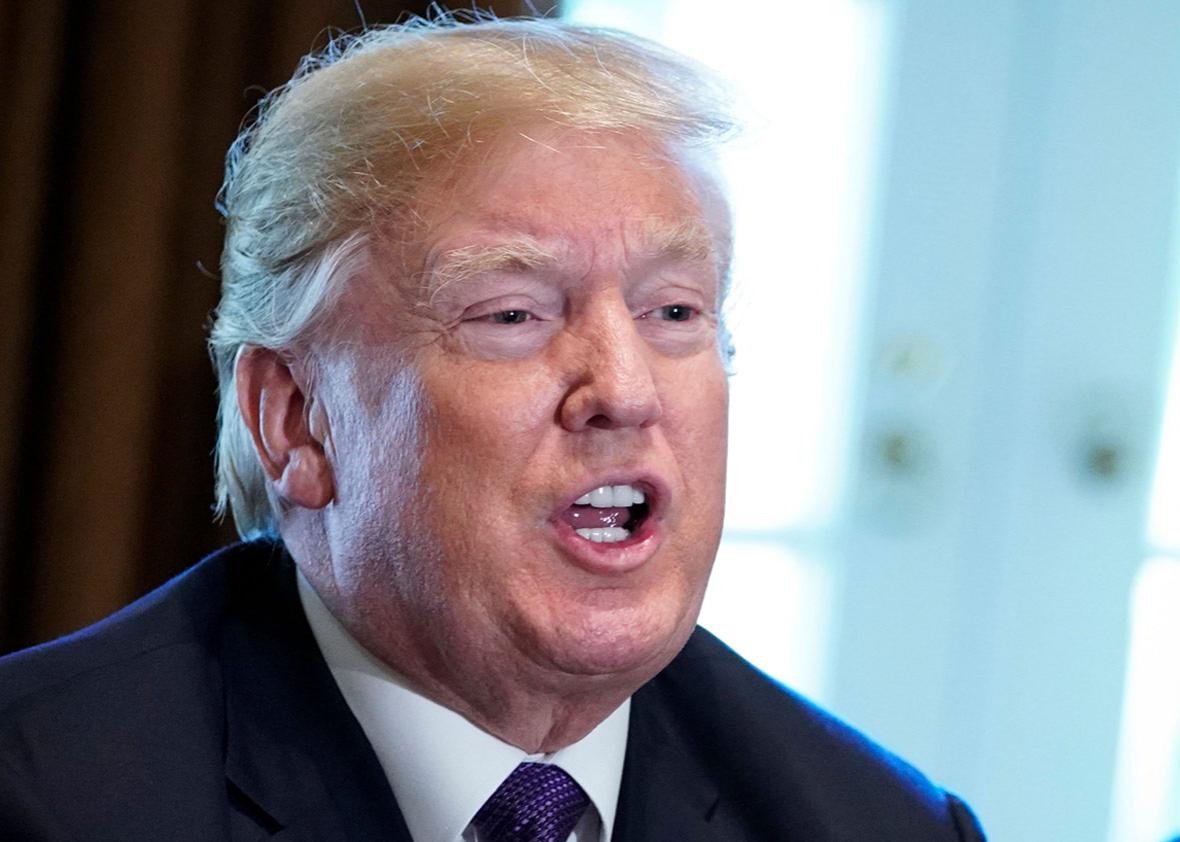October was supposed to be a month of progress for President Trump, when he and Congress could focus on crafting a budget and clearing a path for tax reform. Instead, it’s been another month of turmoil, from his eruption at the NFL over player protests of police brutality to this week’s clash with a military widow and her representative in Congress.
These fights often feel like a series of needless provocations—clumsy forays into the “culture wars” that harden opposition to Trump’s presidency even as they mobilize his most fervent supporters. But each one reveals a part of Trump’s psyche. If his fight with the NFL underscored his willingness to use racial grievance to rally his supporters, then his comments to the widow of a fallen soldier show precisely who Trump will not respect, under almost any circumstances.
This latest incident began, like most Trump controversies, with an obvious lie. “If you look at President Obama and other presidents, most of them didn’t make calls,” said the president at a Monday news conference in the White House Rose Garden, where he was asked about the death of four Green Berets in Niger. “A lot of them didn’t make calls. I like to call when it’s appropriate.”
Trump’s lie was immediately challenged by former Obama administration officials, who cited his compassion for fallen soldiers and emphasized the fact that Trump hadn’t actually called the families of the fallen Green Berets. On Tuesday, he did just that, calling Myeshia Johnson, widow of Sgt. La David T. Johnson, one of the slain soldiers. But his attempt to offer condolences went awry. Both Johnson’s mother and Rep. Frederica Wilson, a Florida congresswoman who is close to the family, were present for the president’s phone call. And both said he was insensitive to Johnson’s widow, telling her that her husband “knew what he signed up for,” and referring to him as “your guy.” Whatever Trump might have meant, the tone was a conspicuous departure from the beginning of the year, when he addressed the widow of a slain Navy SEAL, calling him “a warrior and a hero” during an address to Congress.
Angry and appalled, Wilson criticized the president, which brought a predictable response. “Democrat Congresswoman totally fabricated what I said to the wife of a soldier who died in action (and I have proof),” Trump wrote on Twitter. “Sad!” Later, he denied the account with less inflammatory language: “I didn’t say what that congresswoman said, I didn’t say it all, and she knows it,” the president said to reporters, adding that he had a “very nice conversation with the woman, with the wife, who sounded like a lovely woman.”
It’s tempting to treat this dispute as another sideshow that obscures the actual work of Trump’s presidency. But this assumes Trump is interested in presidential “work” as we typically understand it. The truth is that, for Trump, the distractions are the point. A recent piece in Politico makes this clear:
From the beginning, Trump has staked his political career on “cultural competence, not on policy competence,” according to Amy Walter, senior editor of the Cook Political Report. “I think what he does more than anyone is keeps coming back to the cultural issues as a way to keep reminding voters why they supported him in the first place.”
And what motivated a substantial portion of Trump voters? Racial resentment. Voters with the most negative views of rising diversity in the United States, to say nothing of negative views of blacks, Muslims, and Hispanic immigrants, were the most likely to back Trump in the Republican presidential primary and later in the general election.
When Trump goes after black NFL players or refuses to condemn white nationalists, he’s playing the hits: appealing to the voters that delivered him the GOP nomination and then the presidency.
But Trump might be at his most effective as a demagogue when his foils are women. We saw this last year in the constant attacks on women he perceived as threats, from Alicia Machado to the women who accused him of sexual assault. And we continue to see it in his unending obsession with Hillary Clinton. The president routinely turns to his former opponent in bursts of whataboutism. “So why aren’t the Committees and investigators, and of course our beleaguered A.G., looking into Crooked Hillarys crimes & Russia relations?” asked Trump this summer. This week, Trump expressed his wish to run against Clinton again in 2020, a prospect she has publicly dismissed.
All of this points to a clear pattern in the targets of Trump’s rage, with black women seeming doubly likely to earn the president’s ire. This week it was a congresswoman and a grieving widow, both black. Last month it was Jemele Hill, a black sports commentator who the White House called on to be fired after she called the president a “white supremacist.” Earlier this year, it was former national security adviser Susan Rice, accused of illegally “unmasking” Trump associates during the election. Before that, it was journalist April Ryan and Rep. Maxine Waters.
Whether it’s a knowing choice from the president or it stems from his utter lack of restraint, the attacks reflect his twin contempt for women and nonwhites. Trump pushes back against most criticism, but when it comes from a prominent black woman, the response is more aggressive, more interested in making a spectacle—and an example.
